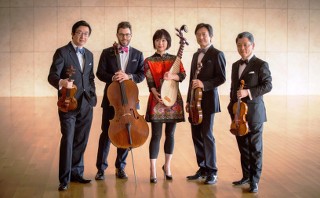|
Back
From chinoiserie to Sheer Excitement New York
Park Avenue Armory
06/20/2017 - & June 21, 2017
Traditional Pipa music
Traditional, arranged by Yi-Wen Jiang: Selections from Chinasong: Reflection of the Moon in the Er-Quan Spring – Morning of the Miao Mountain – Shepherd’s Song – Harvest Celebration
Chinese Folk Song Suite, arranged for String Quartet and Pipa:
Gang Chen and Zhanhan He: Selections from Butterfly Lovers Violin Concerto
Mao Yuan and Liu Tie-Shan: Yao Dance
Zhou Long: Song of the Ch’in for String Quartet
Tan Dun: Concerto For String Quartet and Pipa
Wu Man (Pipa)
The Shanghai Quartet: Weigang Li, Yi-Wen Jiang (Violins), Honggang Li (Viola), Nicholas Tzavaras (Cello)

Li W., N. Tzavaras, W. Man, Li H., Jiang Y.-W. (© Dan Doyle)
That Wu Man is one of the more extraordinary musicians on the international concert stage, and that First Violinist Weigang Li leads a string quartet of ravishing beauty has been obvious for many decades. But it is equally reasonable that these two ingredients together do not necessarily make a foolproof program.
Under three giant portraits of some ancient military figures in the Park Avenue Armory, all five artists performed a program of “Chinese music.” That obviously covers millennia of melodies, tunes and structures. And at least half the program was more than interesting.
At the same time, many of the arrangements for the Shanghai String Quartet could only be called chinoiseries, that word for those ersatz “Oriental” arts that populated the world at the end of the 19th Century.
The music which the Shanghai String Quartet played in the first half of this program was fun to hear, because the group is utterly splendid. Yet the arrangements of poetic tunes, a Mongolian shepherd song and a harvest celebration has the same fake verisimilitude as the “exotic” tunes put out by Borodin and Ippolitov-Ivanov in Russia (imitating eastern Islamic tribes) and MacDowell’s Indian Suite in America.
Three of the numbers could well have been scored by Antonín Dvorák , albeit with fewer modulations, less adventurous harmonies. The one exception, Morning on Miao Mountain, where arranger Yi-Wen Jiang gave us fiddle birdsongs, glissandi, harmonics.
(The “Miao” people I used to visit in northern Thailand might not have recognized these as their songs, save for a few delicious themes peeping through the avian calls, but they would have enjoyed the music.)
Yet all of this was secondary to the opening work, a Pipa solo by Wu Man herself. Her instrument, her beguiling smile, her attitude all have a glowing elegance. Yet it was the plethora of sounds which make her such a singular artist. Her colors could have a single silvery tune, or take on a multi-toned twang, her hands could create the harmonies of a harp, present hard and soft sounds together or replicate the chaotic crowd at a baseball game. (Forgive the tawdry imagery.) The usual pentatonic Chinese notes were frequently noticeable, but through notes in between, microtones, quartet-tones, Wu Man has such a multiplicity of auras and atmospheres, that the words “Chinese music” actually defy definition.
And so after her two introductory pieces, the Shanghai String Quartet arrangements sounded almost technically fine but musically rather thin.
While the audience in the Park Avenue Armory did appreciate this, several people did walk out in the augmented intermission. (A technical problem turned 15 minutes into 25 minutes), and they missed the most interesting parts of the program.
The first was a re-arranged selection from the oft-played slurpy Buttefly Lovers concerto, originally for two violins. By far, the Shanghai String Quartet and Wu Man made this into a work of vividness and subtlety. The usual pair of solo violins were transformed into strong body of music through the combination of Pipa and string quartet.
Wu Man left the stage for the next two works, but the Yao music again turned the Shanghai String Quartet into an exotic instrument (again, no Yao tribespeople I met in Yunan Province would have recognized it, though all would have enjoyed the rhythms.) And for a blazing tour de force, the Song of the Ch’in allowed all four players to imitate a Chinese zither. No Dvorák romance here, but a fabulous transcription.
The final work was–along with Wu Man–one of my major reasons to come here last night, and for others to go tonight. Composer Tan Dun has sometimes, I feel, been more clever than creative. Yet when it comes to blending East and West, as in his opera Marco Polo, he has an unerring genius.
The Concerto for String Quartet and Pipa has a complex history–from his Ghost Opera to Concerto for Pipa and String Orchestra–yet in the arrangement last night, he created a cryptic, complex, highly listenable and highly memorable work.
His own explanation, that it involves both J.S. Bach (the haunting C-Sharp Minor Prelude from the Second Book of Well-Tempered Clavier) and Shakespeare’s Tempest was only the start for a continuous three movement piece of undeniable attraction. The eclecticism was not a trick, the different modes of East and West somehow blended (that was Tan Dun’s creativity) and the entire Concerto was an electric and electrifying experience.
Had this and the Pipa solos been the only works on the program, I would be tempted to return tonight. Yet only mediocre performances are invariably attractive. It sufficed then that we had Wu Man at her best, and the Shanghai String Quartet frequently creating a singular excitement.
Harry Rolnick
|